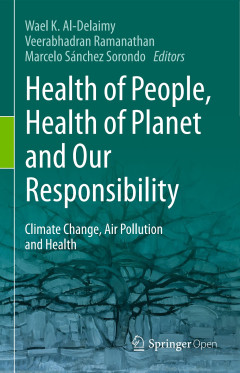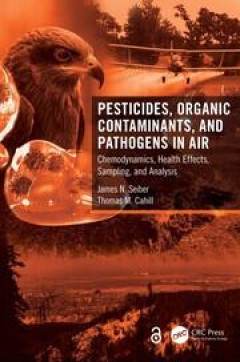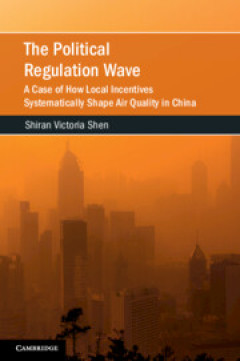Ditapis dengan

Air quality integrated assessment :a European perspective
This book reports on the results of an extended survey conducted across Europe within the framework of the APPRAISAL FP7 project to determine the extent to which an integrated assessment approach to air quality is being adopted, on the one hand, by regional and local authorities to develop air quality plans and, on the other, by researchers. Following a detailed analysis of the role and structu…
- Edisi
- -
- ISBN/ISSN
- 9783319333496
- Deskripsi Fisik
- vii. 110p. : ill.
- Judul Seri
- -
- No. Panggil
- 628.53 AIR a

Health of people, health of planet and our responsibility :climate change, ai…
This open access book not only describes the challenges of climate disruption, but also presents solutions. The challenges described include air pollution, climate change, extreme weather, and related health impacts that range from heat stress, vector-borne diseases, food and water insecurity and chronic diseases to malnutrition and mental well-being. The influence of humans on climate chang…
- Edisi
- -
- ISBN/ISSN
- 9783030311254
- Deskripsi Fisik
- xxiii, 417p. : ill.
- Judul Seri
- -
- No. Panggil
- 363.73874 HEA h

Pesticides, organic contaminants, and pathogens in air :chemodynamics, health…
The air is an important but largely unrecognized source of contaminant fate in the environment, including transport of pesticides and contaminants to nontarget areas and exposures for people and wildlife. This book summarizes and places in perspective the potential transport, transformation, and health implications of pesticides and contaminants in air, including the air we breathe. It delves i…
- Edisi
- -
- ISBN/ISSN
- 9781003217602
- Deskripsi Fisik
- xxix, 230. : ill.
- Judul Seri
- -
- No. Panggil
- 363.73922 JAM p

The Political Regulation Wave :A Case of How Local Incentives Systematically …
Why has there been uneven success in reducing air pollution even in the same locality over time? This book offers an innovative theorization of how local political incentives can affect bureaucratic regulation. Using empirical evidence, it examines and compares the control of different air pollutants in China-an autocracy-and, to a lesser extent, Mexico-a democracy. Making use of new data, appr…
- Edisi
- -
- ISBN/ISSN
- 9781009103664
- Deskripsi Fisik
- xviii, 164 p ; ill
- Judul Seri
- -
- No. Panggil
- 363.7392 POL
 Karya Umum
Karya Umum  Filsafat
Filsafat  Agama
Agama  Ilmu-ilmu Sosial
Ilmu-ilmu Sosial  Bahasa
Bahasa  Ilmu-ilmu Murni
Ilmu-ilmu Murni  Ilmu-ilmu Terapan
Ilmu-ilmu Terapan  Kesenian, Hiburan, dan Olahraga
Kesenian, Hiburan, dan Olahraga  Kesusastraan
Kesusastraan  Geografi dan Sejarah
Geografi dan Sejarah